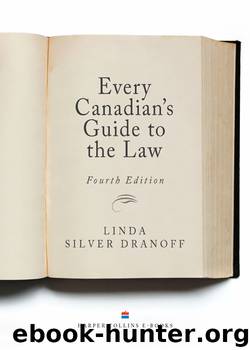Every Canadian's Guide to the Law by Linda Silver Dranoff

Author:Linda Silver Dranoff [Dranoff, Linda Silver]
Language: eng
Format: epub
ISBN: 978-1-4434-0559-1
Publisher: HarperCollins Canada
Published: 2011-02-17T16:00:00+00:00
D. Everyone
1. Rights of Crime Victims
Crime victims have greater rights than ever before, but it is up to the victims to assert them. Victims can have an impact on the conviction of the accused perpetrator, on the severity of the sentence, and on if and when the perpetrator gets parole. Victims also have the right to claim financial restitution and compensation.
Unless there is a guilty plea, victims usually appear in court to testify about the accused’s criminal behaviour. If the accused is convicted, he or she will appear in court for sentencing, at which time victims have the right to file a victim impact statement describing the harm done by the criminal behaviour and the losses suffered. If the victim is dead or unable to make a statement, then a spouse, relative, guardian, or dependant may prepare the impact statement.
Victims may also have a right to limited information about when the offender may be released from prison. They are entitled to obtain from the National Parole Board or Correctional Services Canada such information as when the sentence began, its length, and dates when the offender becomes eligible for unescorted temporary absences and parole.
Victims can usually obtain additional information, at the discretion of the parole authorities, but only if they can establish that their interest outweighs the invasion of the offender’s privacy. Such information could include the name of the institution in which the offender is incarcerated, the date of any hearing, the date and type of release, the offender’s destination, and the conditions of release.
Under current criminal law, victims of sexual assault cannot force their assailants to undergo tests for HIV. However, in a civil suit for damages brought in 1996 by an Ontario rape victim, Madam Justice Ellen MacDonald ordered Paul Bernardo, an admitted rapist, to undergo an AIDS test.
The onus is on the victim to request all information in writing. Similarly, victims must take active steps if they wish to play a part in a parole hearing. They must contact a penitentiary, an office of Correctional Services Canada, or the National Parole Board.
Written victim impact statements have been allowed at parole hearings for some time. While there are no statistics on their effect on parole applications in Canada, U.S. statistics indicate that victim impact statements increase the rate of parole denial from 50 percent to 80 percent.
At the moment, victims’ relatives do not have an automatic say in the early parole of murderers, which is decided by a jury rather than by a parole board (although the government is considering a change in the law). The minimum sentence for first-degree murder is life imprisonment with no parole for 25 years, but a controversial section of the Criminal Code allows convicted murderers to seek parole after 15 years. The Supreme Court of Canada clarified that it is at the discretion of the presiding judge to decide whether permitting victim impact statements is relevant and proper.
In all Canadian jurisdictions, victims of crime can apply for compensation from provincial compensation boards.
Download
This site does not store any files on its server. We only index and link to content provided by other sites. Please contact the content providers to delete copyright contents if any and email us, we'll remove relevant links or contents immediately.
Working for Yourself by J.D. (Nolo) Stephen Fishman(1856)
Every Landlord's Legal Guide by Janet Portman & Stewart Marcia & Ralph Warner(1660)
Working for Yourself by Stephen Fishman J.D. (Nolo)(1515)
A Practical Guide to International Arbitration in London by Hilary Heilbron(1420)
Nolo's Essential Guide to Divorce by Emily Doskow(1407)
Plan Your Estate by Attorney Denis Clifford(1333)
Profit From Your Idea: How to Make Smart Licensing Deals by Attorney Richard Stim(1325)
Nolo's Encyclopedia of Everyday Law: Answers to Your Most Frequently Asked Legal Questions by Shae Irving & Nolo (Editor)(1319)
Introduction to the study and practice of law in a nutshell by Kenney F. Hegland(1314)
American Bar Association Guide to Wills and Estates by American Bar Association(1246)
How to Plan and Settle Estates by Edmund Fleming(1245)
Nolo's Encyclopedia of Everyday Law: Answers to Your Most Frequently Asked Legal Questions by Shae Irving; Nolo (Editor)(1233)
The Trademark Guide by Lee Wilson(1224)
American Bar Association Guide to Wills and Estates, Fourth Edition: An Interactive Guide to Preparing Your Wills, Estates, Trusts, and Taxes by American Bar Association(1216)
The Writer's Legal Guide by Tad Crawford(1199)
The Essential Executor's Handbook by David G. Hoffman(1152)
Limited Liability Companies For Dummies by Jennifer Reuting(1116)
Later-in-Life Lawyers: Tips for the Non-Traditional Law Student by Cooper Charles(1113)
9:41 by Iannuzzi John Nicholas;(1095)
